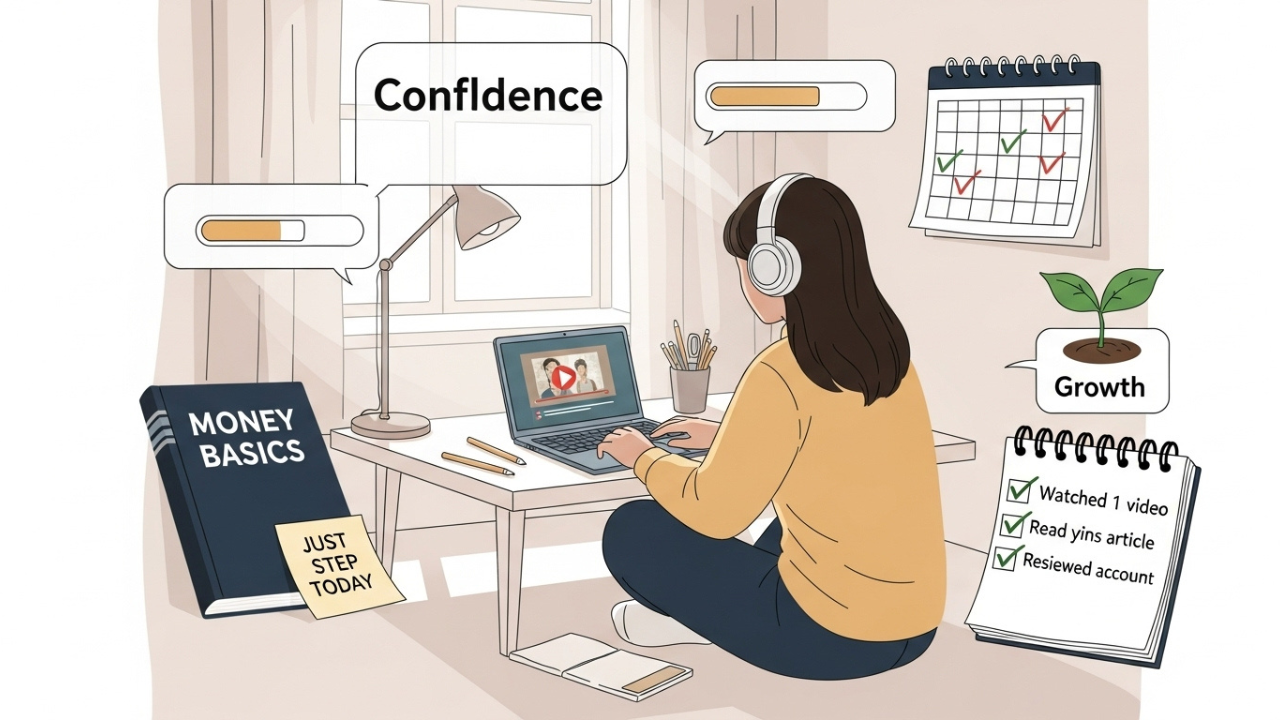Being young, the same words are repeated practically all the time, mentioning these things: starting to save early, investing when it is possible by being young, or the time is the greatest asset you have. However, nobody actually defines what that implies.
Everyone casually says these words like they are common sense but they forget how overpowering it is to have to be told that and you do not know what to even start. You have rent to pay, loans to take, there is pressure to achieve something and fear that you spoil everything. Okay, then, let us slacken this on. Let’s talk like real people. And let’s walk through what smart investing actually looks like for someone just starting out.
You don’t need a degree in finance. You don’t need a big paycheck. What you want is a steady straight way. A strategy that illustrates to you how to put your money to work without throwing your life upside-down. This is not a thing about getting rich quickly. It is all about forming habits that transform your future silently. It is your time but particularly when you are still young and would want to know how you can take charge of your money.
Key Takeaways
-
When you are young, you do not need a lot of it in order to invest your money.
- The habits are important and not the quantity of investments in initial days.
- Time is your friend and risk is not your enemy.
- Simple tactics tend to triumph over complex tactics.
- The best tool that you have is learning and being consistent.
You Don’t Need a Lot of Money to Start Investing Early
Time is the greatest tool in your toolbox. You might think you need to wait until you earn more. That’s what most people believe. They delay investing because they think they need a certain number in their bank account first. But here’s the truth: every year you wait, you give up something you can’t get back—time. And time is what turns small amounts into big results.
The moment you start putting in early, your funds start multiplying on itself. It does not sit around. It multiplies. This isn’t magic. It’s compound growth. You don’t see it at first. But ten or twenty years later, it’s the difference between financial freedom and lifelong stress.
You don’t need thousands to begin. Even small amounts—invested regularly—can build a future that feels solid. That feeling, where you know your future is handled? That’s what investing early buys you.
How You Feel About Money Shapes Every Financial Move You Make
Let’s stop for a second and talk about something most people skip. Before you open an account or download an app, ask yourself how you really feel about money. Do you avoid it? Does it make you anxious? Are you afraid of losing it, or unsure how to manage it?
Many of us grow up with confusing messages. Maybe you saw your parents struggle. Maybe you were taught that money is stressful. But your beliefs shape your actions more than you think. If you believe money is hard, investing will feel like a battle. If you believe it’s possible—even in small steps—you begin to build trust with yourself.
You don’t need to fix everything today. But being aware helps you make better choices. You’ll begin to notice when fear is running the show, and when discipline can take its place.
Investing Without a Goal Feels Empty—Make It Personal
You’re not just investing for some vague future. You’re investing for freedom. Maybe you want to stop working by 50. Maybe you want to take a year off someday. Maybe you want the peace your parents never had.
When your goals mean something to you, you stay committed. You’re not just moving numbers. You’re building a life. And that you can imagine is that life, then every little deposit becomes progress something like that.
Consider how you want to live ten years on and consider waking up as such. Then ask yourself what kind of decisions help you get closer to it. That’s your goal. That’s your why.
Why You Shouldn’t Invest Until You’re Ready for the Unexpected
People often rush into investing without preparing for the bumps. Then life happens. The car breaks down. The job disappears. And they pull money out of their investments—right when the market is down.
You don’t want to build your future on shaky ground. You need a buffer first. That’s your emergency fund. It’s not exciting, but it keeps everything else safe. You don’t invest this money. You hold it, just in case. It gives you peace. And peace is the secret to long-term thinking.
When your basic needs are protected, you’re not forced to act out of fear. You can let your investments grow, untouched. That’s how wealth builds.
Understanding Risk Is More Important Than Avoiding It
The word risk scares people. But in investing, risk just means the future is uncertain. And the truth is—doing nothing is risky too. If your money sits in a checking account, it loses value slowly through inflation.
The good news is that when you’re young, you have time to ride out the ups and downs. You can take more risk than someone older, because you don’t need the money right away. That gives you power.
But you also need honesty. If a drop in your account would make you panic, you need a safer setup. Your risk level should match your comfort level. It’s not about being fearless. It’s about being smart.
Automating Your Investments Is the Smartest Habit You’ll Build
You don’t need to decide every month whether to invest. In fact, you shouldn’t. Because the moment you leave it up to emotion, you’ll find reasons to delay. You’ll think the market is too high or too low. You’ll get distracted.
Automation changes that. When you set up a regular deposit from your paycheck into your investment account, you take your emotions out of the equation. You build momentum. And momentum is what creates progress.
You don’t need to watch the markets daily. You just need to build a habit that quietly builds your future.
Letting the Right Tools Handle the Work for You
Nobody wants you to be a monetary professional by your age of twenties. As a matter of fact, when one tries to have everything done singlehandedly, it can hold them back. That’s why tools exist—to help you make good choices without the stress.
Some platforms ask you a few questions and then invest for you. They adjust based on your comfort with risk. They spread your money out across different types of investments. And most importantly—they keep you moving forward without overwhelm.
Using smart tools doesn’t make you lazy. It makes you focused. You’re not trying to win the game in one move. You’re trying to stay in it long enough to win.
The Best Investments Are Often the Least Flashy
There’s always a new trend. A hot stock. A crypto boom. A friend who doubled their money overnight. But most of those wins come with risk, stress, and—more often than not—losses.
What works long-term is usually boring. Index funds. Steady portfolios. Broad investments that move with the market, not against it. These options grow slowly, but surely.
You’re not here to impress anyone. You’re here to build a life where money isn’t a source of stress. The quiet path may not go viral—but it works.
Popular Doesn’t Always Mean Smart—Trust Your Plan
It’s easy to get swept up in what everyone else is doing. But their story isn’t yours. Their timeline isn’t yours. And their comfort with risk might be far different from yours.
If you’ve taken time to create a plan, follow it. It’s okay to skip the hype. It’s okay to say no to trends. Your job isn’t to keep up. Your job is to build something steady.
Smart investors don’t chase excitement. They chase freedom. And such wealth is stealthy wealth that breeds itself underground where nobody notices and one day in life comes out in the form of peace and choices.
Learn at Your Own Pace Without Burning Out
You don’t need to learn everything today. And you shouldn’t try. The financial world can feel huge, but you only need small pieces at a time. Pick one source you trust. Read one chapter. Watch one video.
The goal isn’t perfection. It’s progress. When you learn something new—even once a week—you build confidence. You begin to understand what’s happening in your account. You stop feeling like a beginner.
That confidence is what keeps you going when things get confusing. It becomes your anchor. And it grows the more you show up.
You Grow, Your Plan Grows—Make Time to Check In
Your twenties are full of changes. New jobs. New homes. New goals. So it makes sense that your investment plan might need a few updates along the way.
You don’t have to make changes every month. But checking in once or twice a year helps. Look at what you’ve built. Look at what’s changed. Maybe you can invest a little more. Maybe you need to shift your goals.
This habit keeps you connected. It keeps your money working for your real life—not the life you had two years ago. And that flexibility is key.
My Opinion
Here’s the truth no one says out loud: you’re not really investing for money. You’re investing for freedom. You’re building a life where you don’t have to say yes out of fear. Where you don’t stay in a job you hate just to survive. Where you have the space to breathe.
Money isn’t the goal. It’s the tool.
That future starts now. With one decision. One habit. One step.



